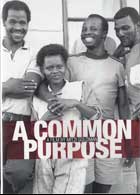
A Common Purpose 2011
Distributed by Icarus Films, 32 Court St., 21st Floor, Brooklyn, NY 11201; 800-876-1710
Produced by Screen Australia, Looking Glass Pictures
Directed by Mitzi Goldman
DVD, color, 77 min.
High School - General Adult
Africa, History, Human Rights, Law
Date Entered: 01/12/2016
Reviewed by Jason R. Harshman, University of IowaThe oppressive and violent history of apartheid in South Africa is well documented. We are familiar with the decades long courageous fight for freedom led by Nelson Mandela, Desmond Tutu, and Steve Biko, however, this film focuses on anti-apartheid activists that viewers may not be as familiar with: Andrea Durbach, Anton Lubowski, and the “Upington 25.”
In 1986, 25 South African men and women were arrested under the “Common Purpose” doctrine for the murder of a police officer. The Common Purpose doctrine stated that even if you were not physically involved in the killing of a person, you could be as guilty as the perpetrator if you were actively associated with the crowd that formed the common purpose, which, in this case, was to kill the police officer. If convicted, the “Upington 25” would all face the death penalty.
The documentary follows the work of lawyers Andrea Durbach and Anton Lubowski to secure the release of the 25 South Africans who they believed were wrongly charged and convicted. Of the archival news footage and photographs from the apartheid period used to tell the story, some of the most moving footage comes from Truth and Reconciliation Commission hearings held in the mid to late 1990s. The film also includes lengthy interview segments with Durbach, who is now the director of the Australian Human Rights Council, and her return to South Africa during the making of this film.
Educators at the secondary and post-secondary levels will find this film to be very useful when teaching about apartheid and post-apartheid South African history. By focusing on the “Upington 25” and Andrea Durbach instead of only individual politicians, students will learn more about how apartheid worked on a local level. Additionally, students will see how citizens who do not hold high political office can work to overturn injustice.
Awards
- 2011 Audience Award, Best Documentary at the Sydney Film Festival (Australia)